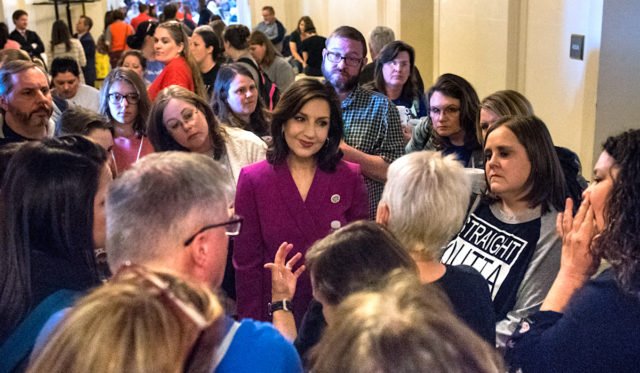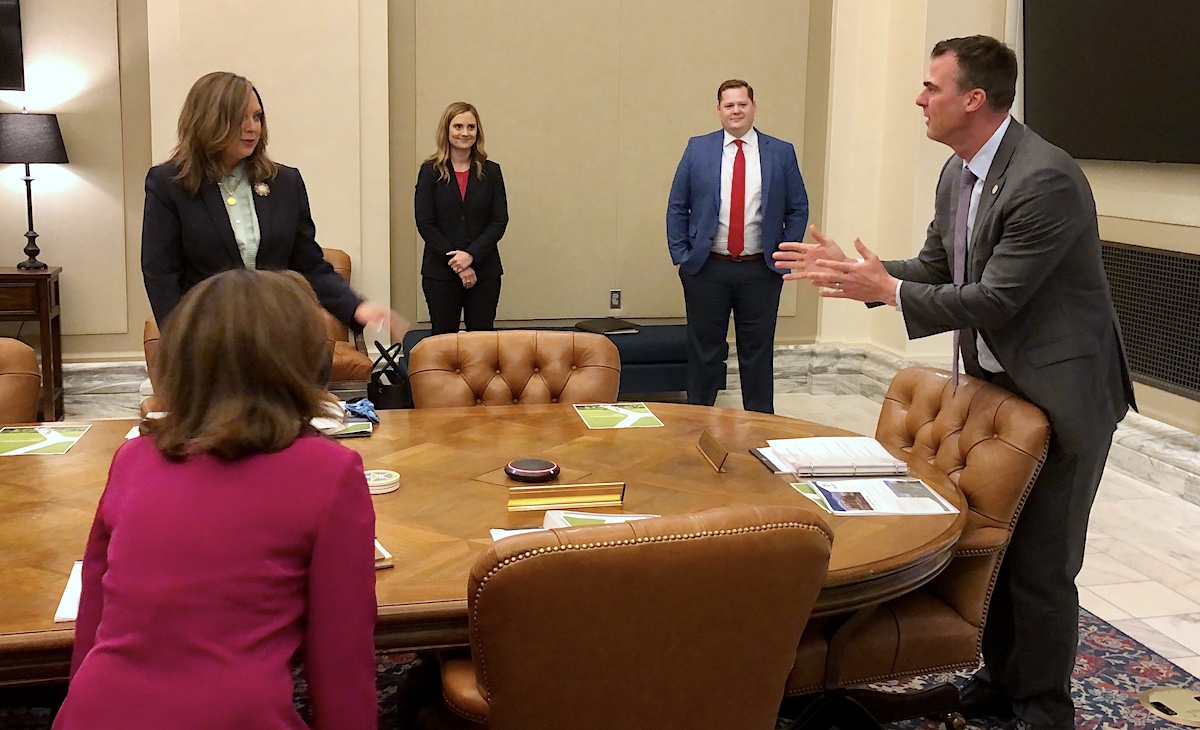

Oklahoma Superintendent of Public Instruction Joy Hofmeister is switching her party affiliation to Democrat as part of a 2022 gubernatorial campaign to challenge incumbent Gov. Kevin Stitt.
Hofmeister must officially change her voter registration from Republican to Democrat by the Oct. 13 statutory deadline for any Oklahoman planning to seek office in 2022.
Hofmeister’s decision was first reported in a Tulsa World story from Andrea Eger and Randy Krehbiel on Wednesday evening. The news came after months of speculation that the former teacher and State Board of Education member was gearing up for a campaign. First elected to lead the State Department of Education in 2014, Hofmeister is ineligible for re-election as state superintendent owing to term limits.
“Coming to these decisions was not easy, but both were 100 percent necessary,” Hofmeister said in a press release announcement. “With partisanship and ineffective leadership, Gov. Stitt is running our state into the ground. I haven’t changed who I am and my values haven’t changed, but unfortunately Kevin Stitt has hijacked the Republican Party here in Oklahoma. I’m switching parties in hopes of building the Oklahoma I’ve always known our state can be.”
Hofmeister said Stitt has been “letting Oklahoma fall behind the rest of the country to chase validation from out-of-state extremists.”
“I’m running for governor as a Democrat because I believe in supporting our children’s education, fighting for better health care and investing in Oklahoma’s infrastructure,” Hofmeister said. “Our current governor does not represent the values that regular Democrats, independents or Republicans hold dear. Values like common sense, working together and courage.”
Hofmeister will become the seventh person to file a formal gubernatorial campaign committee with the Oklahoma Ethics Commission, joining Stitt, former Sen. Ervin Yen (R-OKC), former Sen. Connie Johnson (D-OKC), Libertarian Natalie Bruno and Republican Dr. Mark Sherwood.
Eccentric former Tulsa mayoral candidate Paul Tay has also announced a gubernatorial campaign, but he was arrested in August and charged with rape, kidnapping and assault.
‘We are one Oklahoma’

Hofmeister posted a campaign video on Facebook early Thursday morning that says she has put nearly 500,000 miles on her vehicle “fighting for students” and teachers.
“There will be bumps along the way, but I’ve handled challenges before, I’ve faced down extremism, partisanship, ineffective leadership and Gov. Stitt,” Hofmeister says in the ad. “It’s about getting things done, respecting each other and finding solutions together.”
Hofmeister punctuates the ad by concluding: “We are one Oklahoma.”
While the ad makes no reference to Hofmeister’s party change, an immediate comment on the Facebook post highlights the challenge Hofmeister will face convincing some of her Republican supporters to select her over Stitt in a general election.
“Joy, I have nothing but admiration and respect for you but with the direction of the Democratic party I could never vote for you or any other Democrat,” one woman wrote. “I cannot support the furthering of their policies.”
In recent years, a handful of Oklahoma elected officials have switched parties, but typically after an election. Rep. Johnny Tadlock of Idabel switched from Democrat to Republican for his final term in 2019-2020. Current Reps. Ken Luttrell of Ponca City and Danny Williams of Seminole are Republicans now after previously serving as Democrats.
But Hofmeister becomes the most notable Republican to become a Democrat since Tulsa Sen. Nancy Riley climbed down the elephant and saddled up the donkey in August 2006, causing an evenly split Oklahoma State Senate following the November 2006 election.
‘Having strong education starts with strong families’

Hofmeister told the Tulsa World that switching parties to challenge Stitt first crossed her mind in the spring after a full year of watching how Stitt handled public policy related to the pandemic.
But Hofmeister told NonDoc in a late April podcast recording that she had no interest in challenging Stitt and running for governor.
“Oh my, no,” Hofmeister said. “No, no. I have my hands very full [with] — in all seriousness — the largest and greatest challenge in American history, and we are living through that in Oklahoma, and we have a lot of things we’ve got to keep our focus on right now, and that’s where my focus is.”
Asked how many people had called her to ask her to run for governor, Hofmeister delivered a lengthy answer.
“I think there’s always some joking and kidding and things that go on on social media. Bottom line is, we need to think about keeping our focus on our kids and our teachers, and that’s what I’m going to do. Everyone has their job to do, and we know that having strong education starts with strong families,” Hofmeister said. “And so when I think about how do we help education, we have to think about healthy families having access to health care, strong communities. That social safety net is really important when you think about those that are disadvantaged in some of the parts of Oklahoma that have had lingering challenges. So all of it matters to me when I think about what it will take to really improve things for our kids. The work we do makes a difference, not just in the lives of kids or teachers or those who serve in schools, but the success of communities and the economic opportunities of our state.”
Hofmeister and Stitt continued to clash over the next five months, most visibly after Stitt formally requested that State Auditor and Inspector Cindy Byrd perform a full audit on the State Department of Education — the agency Hofmeister has led since ousting incumbent GOP Superintendent of Public Instruction Janet Barresi in 2014 — and its financial reporting system called OCAS.
Hofmeister called Stitt’s audit request “another attack on Oklahoma’s public education system.”
“At a time during which there are serious audits we have requested which potentially involve criminal activity, and while 541 school districts are struggling to find normalcy during a pandemic, the governor’s attack on public education couldn’t be worse timing for students, families, teachers and taxpayers,” Hofmeister said.
Stitt told NonDoc on Sept. 24 that he was surprised by Hofmeister’s defensive reaction.
“That was perplexing to me how transparency and understanding where money is spent — taxpayer dollars — is an attack on public education,” Stitt said. “We spent $3.2 billion — the most money we’ve ever appropriated to public education this year. We gave our wonderful teachers a big pay raise in 2019. We want to be top-10 in education. There is also $680 million that is flowing in from the CARES (Act) funding into education, and the Legislature requested that we look into those things, and that’s what we’re going to do.”
Stitt said he called for the audit of Epic Charter Schools and “we found out that (…) the money wasn’t flowing where it was supposed to be flowing.”
“[OSDE] was involved in overseeing Epic, and when we found out some things there, then I wanted to expand that to look at other parts of education,” Stitt said. “Again, it’s a no-brainer.”
Independent expenditures expected
Both Hofmeister and Stitt are expected to have large financial war chests at their disposal when the 2022 election really heats up. Stitt’s 2021 second-quarter financial report with the Ethics Commission shows him with $1.2 million cash on hand, although the report references $4.9 million of debt from personal loans made during his 2018 campaign.
Hofmeister’s only active campaign committee from her 2018 re-election bid as a Republican has $167.31 in it, with $23,217.71 in debt listed.
Both Stitt and Hofmeister are expected to have their campaigns supported by extensive independent expenditure efforts, which often shroud their sources of funding and can take virtually unlimited donation levels.
Stitt has clashed with the largest tribal nations located in Oklahoma, and it is likely that some influential tribal leaders will back Hofmeister — or another challenger to Stitt. Cherokee Nation Principal Chief Chuck Hoskin Jr. tweeted the Tulsa World article late Wednesday night.
Hofmeister, however, has faced scrutiny before related to the operation of an independent expenditure campaign to support her original bid for state superintendent. Oklahoma County District Attorney David Prater charged Hofmeister, political strategist Fount Holland and two others with conspiracy and computer crimes in November 2016. Hofmeister was also charged with violating state campaign laws. The district attorney alleged that Hofmeister, Holland and others conspired to funnel money into a third-party campaign committee to support her 2014 bid for office.
Prater dropped the charges against all parties in August 2017, but he insisted that “we’re not done” examining the defendants.
Hofmeister maintained that she had no knowledge of the dark money operation supporting her.
The three-day official filing period for Oklahoma’s 2022 election will start April 13.




















